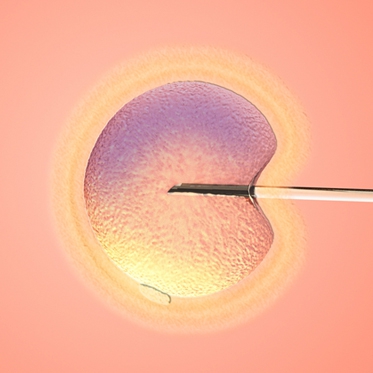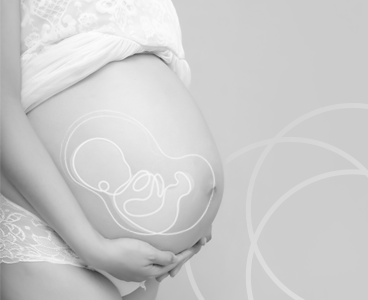
Intrauterine artificial insemination is a technique that consists of depositing fertile sperm in the uterus.
It is a simple technique, which requires having at least two million motile sperm and the tubes without any type of obstruction.How is intrauterine artificial insemination performed to get the best chance of getting pregnant?
Ovulation is gently stimulated to avoid unforeseen events, increase its effectiveness, but avoid multiple pregnancies
A few hours before ovulation
We deposit the sperm behind the cervix, a real barrier for them, staying closer to their final destination
Prior to insemination, the motile and normal spermatozoa are separated from the rest of the semen components (seminal plasma, immobile spermatozoa and other cells) in the laboratory.

The efficiency of this technique is 15-20% per cycle with the spouse’s semen and 25-35% with bank semen. At the Cefer Institute, we carry out a maximum of 3 cycles. If pregnancy is not achieved, we recommend in vitro fertilization, with 50% pregnancy rates.
Recent scientific studies show that the risk of genetic disease is greater than previously thought, even in the absence of a family history.
The new genetic tests are a revolution in reproductive medicine since they allow the study of a large number of diseases at the same cost as until recently for just one. Because it is better to prevent.
The new Compatibility tests offer us the maximum possible prevention today. They allow, with just giving a small blood sample, to know which genes can transmit disease, (even without a family history, if they coincide with those of your partner for the more than 310 frequent and high-impact genetic diseases studied, and thus prevent affected babies Looking for your ideal donor, with a genetic profile compatible with the woman, because we want a healthy family.
Many more diseases studied at much lower cost than the traditional equivalent. With the genetic test, the cost per disease studied does not exceed €3.
It provides more information on each disease than current diagnostic methods. An example: the traditional study of Cystic Fibrosis (valued at €330) studies 34 mutations of the causative gene; With the Compatibility test we studied 140 mutations of this gene (+400%). And in addition to Cystic Fibrosis, the Compatibility test studies more than 310 genetic diseases.
Among the diseases studied are those with the greatest impact such as Cystic Fibrosis, Fragile X Syndrome, Spinal Muscular Atrophy, Sickle Cell Anemia, Alpha and Beta Thalassemia, and Tay-Sachs Disease.
In this line, at the Cefer Reproduction Institute we will continue to incorporate the latest innovations to transfer these improvements to our patients. At Cefer, we advance for you. For a healthy family.
Plan de acompañamiento psicológico
Porque sabemos lo importante de la psicología para el éxito del tratamiento y para tu confort, ponemos a tu disposición el apoyo de un/a profesional que te ofrecerá herramientas y consejos para gestionar mejor las emociones en un momento en que las hormonas, la incertidumbre o simplemente no comunicarlo a la familia o en el trabajo hace que te falten los apoyos habituales. Nadie mejor que un/a experto/a en psicología especializado en reproducción asistida para acompañarte y darte apoyo durante todo el proceso.
If you need sperm from an anonymous donor, we will tell you about some of the advantages of our sperm bank.
Get personalized information about Artificial Insemination (AI), contact us without any commitment.
Gran Vía de les Corts Catalanes, 416A
08015 Barcelona – España
Telf. 93 254 60 70
E-mail: info@icefer.es
Gran Vía de les Corts Catalanes, 416B
08015 Barcelona – España
Telf. 93 240 40 60
E-mail: bancosemen@icefer.es
Governador montcada nº 13, bajos
25002 Lleida – España
Telf. 973 27 30 69
E-mail: lleida@icefer.es
© 2024 Instituto CEFER | Política de cookies | Administrar cookies | Política de privacidad y Aviso legal
| Cookie | Duration | Description |
|---|---|---|
| __cf_bm | This cookie, set by Cloudflare, is used to support Cloudflare Bot Management. | |
| __hssc | HubSpot sets this cookie to keep track of sessions and to determine if HubSpot should increment the session number and timestamps in the __hstc cookie. | |
| __hssrc | This cookie is set by Hubspot whenever it changes the session cookie. The __hssrc cookie set to 1 indicates that the user has restarted the browser, and if the cookie does not exist, it is assumed to be a new session. | |
| cookielawinfo-checkbox-advertisement | Set by the GDPR Cookie Consent plugin, this cookie records the user consent for the cookies in the "Advertisement" category. | |
| cookielawinfo-checkbox-analytics | Set by the GDPR Cookie Consent plugin, this cookie records the user consent for the cookies in the "Analytics" category. | |
| cookielawinfo-checkbox-functional | The GDPR Cookie Consent plugin sets the cookie to record the user consent for the cookies in the category "Functional". | |
| cookielawinfo-checkbox-necessary | Set by the GDPR Cookie Consent plugin, this cookie records the user consent for the cookies in the "Necessary" category. | |
| cookielawinfo-checkbox-others | Set by the GDPR Cookie Consent plugin, this cookie stores user consent for cookies in the category "Others". | |
| cookielawinfo-checkbox-performance | Set by the GDPR Cookie Consent plugin, this cookie stores the user consent for cookies in the category "Performance". | |
| CookieLawInfoConsent | CookieYes sets this cookie to record the default button state of the corresponding category and the status of CCPA. It works only in coordination with the primary cookie. | |
| elementor | The website's WordPress theme uses this cookie. It allows the website owner to implement or change the website's content in real-time. | |
| viewed_cookie_policy | The GDPR Cookie Consent plugin sets the cookie to store whether or not the user has consented to use cookies. It does not store any personal data. |
| Cookie | Duration | Description |
|---|---|---|
| wp-wpml_current_language | WordPress multilingual plugin sets this cookie to store the current language/language settings. |
| Cookie | Duration | Description |
|---|---|---|
| __hstc | Hubspot set this main cookie for tracking visitors. It contains the domain, initial timestamp (first visit), last timestamp (last visit), current timestamp (this visit), and session number (increments for each subsequent session). | |
| _fbp | Facebook sets this cookie to display advertisements when either on Facebook or on a digital platform powered by Facebook advertising after visiting the website. | |
| _ga | Google Analytics sets this cookie to calculate visitor, session and campaign data and track site usage for the site's analytics report. The cookie stores information anonymously and assigns a randomly generated number to recognise unique visitors. | |
| _ga_* | Google Analytics sets this cookie to store and count page views. | |
| _gat_UA-* | Google Analytics sets this cookie for user behaviour tracking. | |
| _gcl_au | Google Tag Manager sets the cookie to experiment advertisement efficiency of websites using their services. | |
| _gid | Google Analytics sets this cookie to store information on how visitors use a website while also creating an analytics report of the website's performance. Some of the collected data includes the number of visitors, their source, and the pages they visit anonymously. | |
| CONSENT | YouTube sets this cookie via embedded YouTube videos and registers anonymous statistical data. | |
| hubspotutk | HubSpot sets this cookie to keep track of the visitors to the website. This cookie is passed to HubSpot on form submission and used when deduplicating contacts. |
| Cookie | Duration | Description |
|---|---|---|
| IDE | Google DoubleClick IDE cookies store information about how the user uses the website to present them with relevant ads according to the user profile. | |
| test_cookie | doubleclick.net sets this cookie to determine if the user's browser supports cookies. | |
| VISITOR_INFO1_LIVE | YouTube sets this cookie to measure bandwidth, determining whether the user gets the new or old player interface. | |
| YSC | Youtube sets this cookie to track the views of embedded videos on Youtube pages. | |
| yt-remote-connected-devices | YouTube sets this cookie to store the user's video preferences using embedded YouTube videos. | |
| yt-remote-device-id | YouTube sets this cookie to store the user's video preferences using embedded YouTube videos. | |
| yt.innertube::nextId | YouTube sets this cookie to register a unique ID to store data on what videos from YouTube the user has seen. | |
| yt.innertube::requests | YouTube sets this cookie to register a unique ID to store data on what videos from YouTube the user has seen. |
| Cookie | Duration | Description |
|---|---|---|
| _cfuvid | Description is currently not available. | |
| VISITOR_PRIVACY_METADATA | Description is currently not available. |